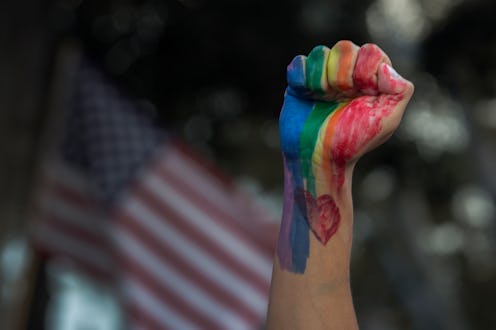
LGBTQ teenagers are almost twice as likely to be bullied by their peers, and they are four times more likely to die by suicide, according to Mental Health America. But a new study claims that romantic relationships can help LGBTQ youth avoid emotional distress and even potentially mitigate the harmful effects of bullying. Researchers from Northwestern University and the University of Cincinnati analyzed data from Project Q2, a long-term study of LGBTQ adolescents and young adults. They found that students in relationships suffered "significantly less psychological distress and were buffered against the negative effects of bullying and victimization" compared to single students, according to a press release about the findings.
Dr. Brian Mustanski, the director of the Institute for Sexual and Gender Minority Health and Wellbeing at Northwestern University Feinberg School of Medicine and the study's corresponding author, said in the press release that relationships can greatly improve your quality of life. "Your romantic partner can be the first person you reach out to when you have good news to celebrate or for a shoulder to cry on when you have bad news," he said. "Having a partner then can amplify the good things in life and provide critical support during tough times."
The researchers specifically noticed a positive trend among Black LGBTQ youth, according to the study's abstract. There wasn't difference in emotional distress for white participants, and bisexual teens in relationships actually experienced more distress. "These findings suggest that being in a romantic relationship may promote mental health for many, but not all, young sexual minorities," the abstract says.
The Centers for Disease Control and Prevention says that LGBTQ youth face a disproportionate amount of violence — 34 percent have been bullied at school, and another 28 percent have been bullied online. One in 10 LGBTQ teens has been threatened with a weapon on school property. According to StopBullying.gov, the most effective way to stop bullying is to make encourage LGBTQ youth to report bullying incidents and discuss bullying openly.
"There are lot of questions about if and how we should help LGBT teens form romantic relationships, so that they can have the same experiences of dating and learning about relationships as their heterosexual peers," said Sarah Whitton in the press release. Whitton is the study's lead author and associate professor of psychology at the University of Cincinnati. "The findings suggest there might be great value in initiatives that could help LGBT youth meet other youth such as citywide 'queer proms,' and engage in healthy learning about dating and romance."
Other research has shown the importance of having a support system when it comes to bullying — according to Riley Hospital for Children at IU Health, friendship is "one of the most powerful tools to help kids fight bullying" — and if you've experienced bullying of any kind, you can probably attest to this yourself. But this study provides a convincing reason to encourage LGBTQ teens to socialize. According to the press release, these findings only apply to romantic relationships and not friendships or even a healthy relationship with parents, but those things definitely can't hurt.
Once LGBTQ youth are in romantic relationships, how can we make sure they're having safe sex? A new study from the University of Pennsylvania found that parents are often ill-equipped to talk to their kids about sex in a sexuality-inclusive way, which makes the "birds and the bees" talk largely ineffective for LGBTQ teens. “The growing information on how sex communication occurs between parents and LGBTQ children can ultimately help families and health care providers address this population’s health outcomes through inclusive sex communication,” says the study’s senior author Dalmacio Flores, PhD, ACRN, Postdoctoral Fellow in Penn Nursing’s Department of Family and Community Health. “Supporting parents’ capacity to address the needs of their LGBTQ children through inclusive sex communication has the potential to minimize risk behaviors before these youths leave the confines of the home.”
Dating as a teenager and young adult can provide a ton of benefits for LGBTQ youth and leave them better equipped to handle bullying, but it's important that we still prioritize anti-bullying measures — high school relationships aren't exactly known for their longevity, so it's not a foolproof solution. But according to this research, allowing LGBTQ teens to date and equipping them with safe sex knowledge can have a remarkable effect on quality of life.